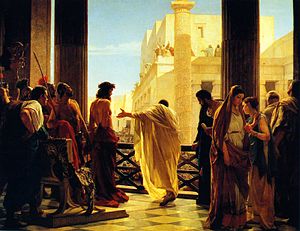 Image via WikipediaBEHOLD THE LAMB OF GOD
Image via WikipediaBEHOLD THE LAMB OF GODAn Easter Series - Part 4 of 7
I. Betrayal of Jesus
Judas Iscariot, in exchange for 30 pieces of silver, led a large group, sent from the priests, to Jesus.
-- In the Garden of Gethsemane. He “knew the place.” (John 18:2-12)
-- Betrayed with a kiss. (Matthew 26:48-49)
-- Later, Judas’ remorse and suicide.
“The Son of Man is to go, just as it is written of Him; but woe to that man by whom the Son of Man is betrayed! It would have been good for that man if he had not been born.” (Matthew 26:24)
II. Arrest of Jesus
A multitude of soldiers and officers from the chief priests, scribes, and elders took Jesus into custody after initially falling back (John 18:6) when He identified Himself. Peter put up some resistance, but Jesus would not allow it. “…the cup which my Father hath given me, shall I not drink it?” (18:11). They arrested and bound Jesus (v. 12).
III. Denial of Jesus
Peter, after trying to defend Jesus with the sword, later denied him three times. Later, Jesus looked upon him, he went out and wept bitterly.
IV. Rejection of Jesus as Messiah
Jesus is taken to the house of Annas, former high priest and father-in-law of Caiaphas, where he is mistreated and questioned. He is then taken to the Sanhedrin and further abused.
“…And the high priest answered and said unto him, “I adjure thee by the living God, that thou tell us whether thou be the Christ, the Son of God.”
Jesus said unto him, “Thou hast said: nevertheless I say unto you, Hereafter ye shall see the Son of man sitting on the right hand of power, and coming in the clouds of heaven.” (Matthew 26:63-64)
Then they sentenced Him to death. they spat upon Him and struck Him with their hands.
The Sanhedrin formally condemned Jesus after dawn, in an attempt to make the condemnation legal (Matthew 27:1). A.T. Robertson points out, “But no ratification of a wrong can make it right.” (A Harmony of the Gospels, p. 215, footnote).
V. Delivery of Jesus To Be Put to Death
The Jewish religious leaders took Jesus to Pontius Pilate, the Roman procurator, where they demanded Jesus’ death. Pilate sent Jesus to Herod Antipas, ruler of Galilee, who mistreated him and sent him back to Pilate. Pilate, under great pressure from the Jewish leaders and the crowd, and in spite of a plea from his (Pilate’s) wife, and his own opinion that Jesus had done nothing wrong, delivered him to be crucified.
Pilate asked Jesus if he were a king. Jesus said, “My kingdom is not of this world …. Thou sayest that I am a king. To this end was I born, and for this cause came I into the world, that I should bear witness unto the truth. Every one that is of the truth heareth my voice.” (John 18:36, 37). Pilate said, “What is truth?” (v. 38)
A. Pilate’s reluctance: “I find no fault I him.” (John 19:6)
1. Pilate did not think Jesus was guilty of anything
2. Pilate had been warned by his wife not to do anything against Jesus.
B. The Jews’ demands: “And from thenceforth, Pilate sought to release him; but the Jews cried out, saying, If thou let this man go, thou art not Caesar’s friend: whoever maketh himself a king speaketh against Caesar.” (John 19:12)
“When Pilate saw that he could prevail nothing, but that rather a tumult was made, he took water, and washed his hands before the multitude, saying, I am innocent of the blood of this just man: see ye to it.” (Matthew 27:24)
C. The Jews’ acceptance of responsibility: “Then answered all the people, and said, His blood be on us, and on our children.” (Matthew 27:25)
D. Pilate’s capitulation: “Then released he Barabbas unto them; and when he had scourged Jesus, he delivered him to be crucified.” (Matthew 27:26)
1. He lacked the courage to stand up to the Jews, fearing he would lose his position.
2. He gave Jesus over to be crucified. Though Pilate had declared Jesus innocent, he shared in the guilt of Jesus‘ crucifixion.
Conclusion
Even as Christians, are we guilty of denying the Lord? If you haven’t become a Christian, do you continue rejecting the Lord? Do you desire to please someone else by rejecting Jesus? Are you willing to bear your own guilt to eternity rather than trust Jesus?
Are you more accepting of sin than the forgiveness of Jesus, as the crowd that desired the release of Barabbas rather than Jesus?
Remember, we have delivered Him to death by our sin. Jesus voluntarily went to the cross. This was the only way for mankind to receive salvation. God used the great crime against His Son as the payment for our sin. God wants everyone who believes to receive, through faith, the benefit of Jesus’ sacrifice.
Direct Scripture quotations are from the King James Version.
Illustration: Antonio Ciseri's (1821-1891) depiction of Pontius Pilate presenting a scourged Christ to the people, Ecce homo! (Behold the man!). Painted in 1871. Public domain.

No comments:
Post a Comment